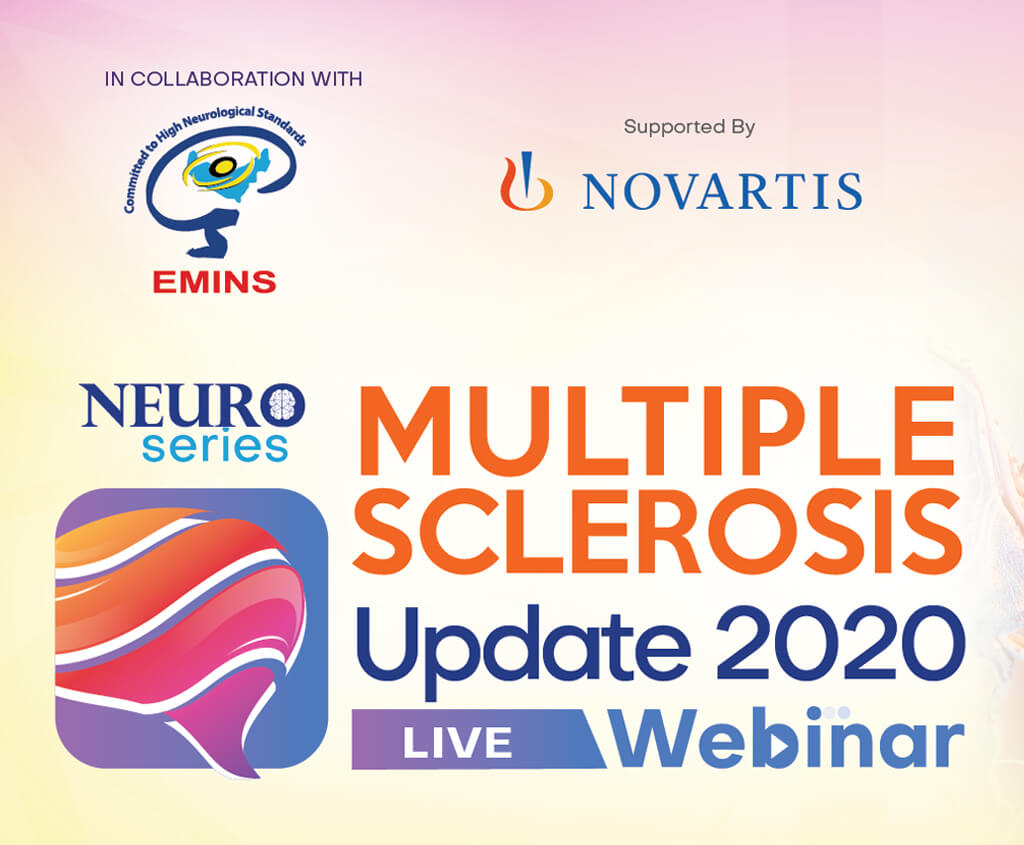The two-day webinar on MULTIPLE SCLEROSIS Update, held under the auspices of the Emirates Neurological Society (EMINS) and supported by NOVARTIS, was rich with the presence of experts and a lot of updates about MS. It has marked record participation on both the days. The fruitful event has been the richest with the best speakers and 1000 attendees throughout the Sessions. Webinar Chairman Dr. Suhail Abdulla Alrukn, president of Emirates Neurology Society and Consultant Neurologist at Rashid Hospital, UAE, has appointed the panel of speakers that include Dr. Robert K. Shin, Professor at Department of Neurology and Director of Georgetown Multiple Sclerosis & Neuroimmunology Center, MedStar Georgetown University Hospital, USA, Dr. Taleb Mohamed Almansoor, Assistant Dean of Clinical Affairs and Assistant Professor of Diagnostic Radiology, Department of Diagnostic Radiology, College of Medicine and Health Sciences, United Arab Emirates University, and Dr. Mona Al Khawajah, Consultant Neurologist at the Neurosciences Department, King Faisal Specialist Hospital and Research Center, Riyadh (KFSHRCR), KSA.
The main attraction of the webinar was the dedicated interactive question and answer session which helped the participants to clear their doubts and gain knowledge and its success was evidenced by the compliments were received in the chat box praising the webinar. The webinar was conducted in a very useful and informative manner for people who suffer from Multiple Sclerosis the most and even disturb the balance of life.
Day 1:
Webinar chairman Dr. Suhail Abdulla Alrukn delivered the opening remarks and welcomed Dr. Robert K. Shin and Dr. Taleb Mohamed Almansoor to the event.
Dr. Robert K Shin had a valuable session on the topic of ‘Reimagining MS: Updates on B Cell Therapies’. He said that we can imagine MS with a better understanding of the Pathophysiology, better management options, and breaking old habits. Dr. Robert primarily focused on B cells, which are produced in the bone marrow and activated in secondary lymphoid organs, in MS pathology. B-cell depletion is proposed to impact abnormal B-cell responses via direct and indirect effects on MS pathology involving autoantigen presentation, cytokine production, autoantibody production, and ectopic lymphoid structures. He shared data about 3 types of Anti-CD20 Monoclonal Antibodies such as Rituximab, Ocrelizumab, and Ofatumumab. Data presented from separate pivotal clinical trials have clearly explained and differentiated the efficacy of these three antibodies in B cells therapies. According to him, studies in a broad RMS population successfully demonstrated that ofatumumab has efficacy in lowering relapse rates and MRI activity. Ofatumumab with monthly 20 mg s.c. dosing regimen demonstrated high efficacy and a favorable safety profile.
Dr. Taleb Mohamed Almansoor focused on MRI Mimics of Multiple Sclerosis and updated criteria for diagnosis. He opined that many neurological diseases can mimic MS both clinically and radiologically. Although there are many, he discussed lesions, symptoms, and diagnosis criteria of a few rare conditions that mimic MS. These conditions include Neuromyelitis Optica Spectrum disease, Acute Disseminated Encephalomyelitis, Cerebral Radiation Necrosis, Osmotic Demyelination Syndrome, Hypertrophic Olivary Degeneration, Posterior Reversible Encephalopathy Syndrome, Chronic Microangiopathic Disease, Cerebral Autosomal Dominant Arteriopathy with Sub-cortical Infarcts and Leukoencephalopathy (CADASIL), Cerebral vasculitis secondary to Behjet Disease, SUSAC Syndrome, and Adrenoleukodystrophy.
After the interactive Q& A session, Dr. Suhail Abdulla Alrukn thanked both the experts for the effective sessions.
Day 2:
The second-day session of the update series in MS started with a brief from the chairman Dr. Suhail Abdulla Alrukn and he welcomed Dr. Mona Al Khawajah, Dr. Taleb Mohamed Almansoor, and all the attendees to the session.
Dr. Mona Al Khawajah took the session on ‘Virtual Neurology-Catering to MS patients Remotely’ in spite of the current pandemic situation. According to Duke University School of Medicine, the use of tele-visits over 4 weeks has increased from less than 1% of visits prior to COVID-19 to 70% (1000 visits per day). She opined that telemedicine is “crossing the chasm” between being an interesting but rarely used technology to being essential. Her session incorporated the basic types of telemedicine such as synchronous and asynchronous, and typical categories of telemedicine function. Great potential to improve health care services worldwide by enhancing access, quality, efficiency, and cost-effectiveness, inclusiveness, patient-provider communication enhancement, and educational opportunities contribute to the growth of telemedicine. Dr. Mona said that in low-income countries tele-neurology may enhance local capabilities via education, diagnostic assistance, and consultation, whereas in high-income countries neurological care will expand from hospitals and clinics to homes and mobile devices. Feasibility, patients’ acceptance and Satisfaction, telerehabilitation, other potential applications for telemedicine, challenges, and legalities were also discussed in the session. Tele Medicine in MS can be feasible and is an important complementary method to overcome some challenges in the traditional heartcare systems. More research is needed to improve our understanding of the techniques and mechanics, cost-effectiveness, safety, and reliability of TM in MS.
Dr. Taleb Mohamed Almansoor focused on MRI Mimics of Multiple Sclerosis and updated criteria for diagnosis. As part of the continuation of his session on the first day, Dr. Taleb Mohamed Almansoor focused on updated criteria for diagnosis Multiple Sclerosis. His session included the typical MRI findings of MS, updated criteria for diagnosis, protocols, and patterns of communication between the physicians and radiologists for the sake of patients’ benefits.
Webinar chairman Dr. Suhail Abdulla Alrukn conducted the Q&A session at the end and expressed his appreciation and sincere gratitude to the members for facilitating the webinar with so many participants.
